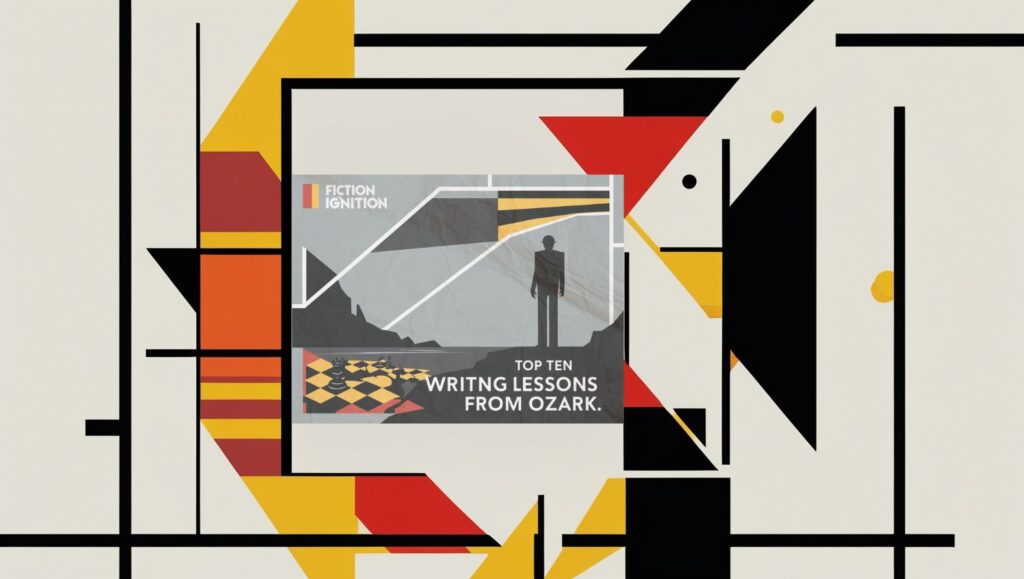Greetings, Fiction Igniters! Gather around the bonfire, because today we’re talking about one of the most controversial movies in recent memory: Emilia Pérez. This film is getting all sorts of awards and it just received 13 Academy Award nominations (the same amount as Oppenheimer!), and is one of the frontrunners to win best picture.
Yet, to many of us, this movie is an insufferably pretentious, tone-deaf, and artistically bankrupt mess. Lucky for us, it’s a goldmine of writing lessons—not because it does things right, but because it gets them so spectacularly wrong.
So, let’s light the torch and dive into the Top 10 Things I learned about writing from Emilia Pérez!
10. Pretension Is Not a Substitute for Quality
Some movies and books scream, “I am important!” but fail at basic storytelling. Emilia Pérez wants to be deep, but it’s shallow. It wants to be profound, but it’s silly.
Great stories aren’t declared—they are earned. When The Godfather delivered “I’m gonna make him an offer he can’t refuse,” it wasn’t just a cool line; it carried layers of menace, power, and subtext that resonated with audiences because it was rooted in the world of the story. Now, contrast that with “Me duele la pinche vulva nada más de pensar en ti,” one of the most baffling lines in cinematic history. It’s meant to be dramatic, yet it’s so absurdly phrased that it becomes laughable. Instead of immersing the audience, it ejects them from the experience entirely, reminding them that they are watching something that doesn’t understand the weight of its own words.
The best writers understand that storytelling isn’t just about saying something important—it’s about how you say it. Hemingway’s iceberg theory emphasized that what is seen on the surface is only a fraction of the real story; the depth comes from the weight of lived experience beneath it. Emilia Pérez operates in the opposite way—it tries to force importance on the audience while offering nothing below the surface. This is why its dialogue falls flat, its themes feel hollow, and its emotional beats lack resonance.
True profundity in storytelling doesn’t come from grand, self-important declarations—it comes from crafting moments that feel real, from characters who breathe with authentic struggles, and from themes that emerge naturally rather than being force-fed. If a story has to shout about its own significance, it’s already failed. The best stories, from Breaking Bad to Mad Max: Fury Road, don’t ask for their audience’s respect—they command it through masterful storytelling, character depth, and a deep understanding of the world they are portraying.
9. Music Should Serve the Story
Musicals can be powerful storytelling tools (Les Misérables, Hamilton, The Lion King), but Emilia Pérez uses music as a crutch. The songs don’t elevate the narrative; they make it feel disjointed and ridiculous. If a musical number doesn’t reveal character, advance the plot, or create a deeper emotional connection, it’s just dead weight.
Lesson: Every creative choice must serve the story. If you’re adding musical numbers, they need to push the plot forward, not just fill time.
8. The Iceberg of Violence: Writing What You Haven’t Lived
Hemingway famously said that writing is about conveying real things—what is seen, felt, smelled, heard, and lived. And under the surface, this is what builds the iceberg, the unseen depth that makes a story feel real. Emilia Pérez is what happens when a writer doesn’t have that lived experience, or worse, doesn’t think they need it. It’s a film that plays with themes of violence, identity, and redemption, yet its understanding of violence is so artificial that it feels detached from reality. There’s no weight to it, no impact, because the writer treats it as an aesthetic choice rather than the raw, brutal force it actually is.
Real violence leaves scars, physical and psychological. It changes people in ways they don’t always understand. Great storytelling captures this truth. Consider Cormac McCarthy’s Blood Meridian or No Country for Old Men. Violence in McCarthy’s work isn’t just an act; it’s an undeniable force of nature, something that twists souls and marks the land. In contrast, Emilia Pérez treats cartel violence like a backdrop, an exotic setting to play with, stripping it of authenticity and consequence.
This lack of depth extends to the characters. Without real stakes, without an understanding of what violence does to people, their decisions feel hollow. In Breaking Bad, Walter White’s descent into darkness is believable because it builds on the weight of his choices. Every act of violence carries emotional and psychological cost. In Emilia Pérez, there are no real consequences; the protagonist’s past can be erased with a new identity, as if violence is just another inconvenience to be written away.
As writers, we must remember: if we haven’t lived something, we must research it, immerse ourselves in it, talk to those who have experienced it. Otherwise, we end up with something like Emilia Pérez—a story that is supposed to be about transformation but ultimately says nothing at all.
Lesson: If you’re writing about a place or culture you don’t intimately know, do your homework. The Godfather immersed us in Italian-American culture because Mario Puzo and Francis Ford Coppola actually cared about authenticity.
7. Bad Execution Ruins Good Ideas
The concept of a cartel boss transitioning and seeking redemption could be a compelling story. But Emilia Pérez botches every aspect of execution: the clunky storytelling, the lack of nuance, the cringeworthy musical numbers.
A strong premise alone doesn’t make a great story—it’s all about how that premise is brought to life. Black Mirror is a perfect example of this. Many of its episodes start with a simple “what if?” scenario, but they become gripping narratives through meticulous storytelling, well-crafted tension, and emotional depth. Compare that to Emilia Pérez, which takes a fascinating premise and squanders it through poor choices at every turn.
Lesson: Execution is everything. Don’t just have an interesting premise—make sure you can pull it off. A great story is built on careful plotting, strong characterization, and well-executed themes. Even the best ideas will fail without proper execution.
6. Authenticity Matters More Than Gimmicks
One of the biggest sins of Emilia Pérez is that it doesn’t feel authentic. It tries to cash in on social issues without understanding them, using surface-level representation instead of deep, meaningful storytelling. The film presents a transgender cartel boss as its protagonist, but rather than treating this character with nuance and realism, it turns them into a gimmick.
Great stories aren’t about checking boxes or pandering to trends—they’re about truth. Consider Dallas Buyers Club, which tackled HIV and LGBTQ+ issues without reducing its characters to symbols. Or Pose, which thrived because it was created by people who actually understood ballroom culture and trans identity. Compare that to Emilia Pérez, which feels like it was written by someone who read a Vice article about Mexico and decided they were an expert.
Lesson: Authenticity matters. If you don’t truly understand a topic, either research it thoroughly or write about something else. Audiences can tell when a story lacks truth.
5. Exposition Overload Kills Storytelling
Show, don’t tell. It’s one of the oldest rules in writing, but Emilia Pérez ignores it completely. Instead of revealing information naturally through actions and dialogue, the film constantly explains itself through clunky exposition.
Great storytelling trusts the audience to pick up on context clues. Look at Breaking Bad or The Sopranos—both shows reveal character motivations through subtext, small gestures, and natural dialogue. They don’t stop the narrative dead in its tracks to spoon-feed explanations.
In contrast, Emilia Pérez seems terrified that the audience won’t “get it,” so it over-explains everything. The result? A story that feels hollow, forced, and artificial.
Lesson: Trust your audience. Let the story breathe. Don’t drown it in exposition.
4. Characters Must Have Agency
A great protagonist makes choices, drives the plot, and changes through their actions. But Emilia Pérez falls into a common trap: treating its lead character as a passive victim of circumstances rather than an active force in their own story.
It’s like the movie tells us that your chromosomes are the reason you become either a ruthless narco boss or a compassionate human rights activist. Are we supposed to just forget that this guy killed and ordered the deaths of hundreds or maybe thousands because his testosterone made him do it?
Compare this to Scarface, where Tony Montana’s rise and fall is entirely driven by his decisions. Every step he takes leads him deeper into the world he has chosen. Now look at Emilia Pérez, where the protagonist drifts through the narrative as things “happen” to them. They don’t drive the story forward; they are dragged along by it.
Lesson: Give your protagonist agency. The best characters shape their own fates.
3. Tone Matters—You Can’t Have It Both Ways
Emilia Pérez can’t decide if it wants to be a serious crime drama or a whimsical musical, and the result is tonal whiplash. One moment, it expects us to take the brutality of cartel violence seriously; the next, it bursts into a song about penises turning into vaginas, like the porn version of a Disney Channel Original Movie.
Great storytelling establishes a consistent tone. The Dark Knight blends action, crime, and drama seamlessly because it understands the mood it wants to create. Breaking Bad masterfully balances dark humor and intense drama without ever feeling inconsistent. Emilia Pérez, on the other hand, swings between extremes, making it impossible for the audience to emotionally invest in anything.
Lesson: Pick a tone and stick with it. If you mix genres, make sure they blend naturally.
2. The Ending Must Deliver on the Premise
A great ending leaves the audience satisfied, whether through closure, surprise, or emotional catharsis. But Emilia Pérez fizzles out. It sets up big ideas but fails to pay them off in a meaningful way.
Compare this to No Country for Old Men, which delivers an ambiguous yet thematically rich ending that fits perfectly with the story. Or Fight Club, where the final moments bring the entire film’s philosophy full circle. Emilia Pérez fails because it builds up a transformation story without actually exploring what that transformation means. The audience is left with nothing but unanswered questions and a sense that the filmmakers themselves didn’t know what point they were trying to make.
Lesson: Earn your ending. Make sure it pays off everything you set up.
1. Respect Your Audience’s Intelligence
The worst crime Emilia Pérez commits? It assumes the audience is stupid. It thinks it can get away with shallow writing, inconsistent characters, and a nonsensical plot because it has a “prestige” aesthetic. But audiences today are smarter than ever. They recognize authenticity, depth, and effort.
Look at Mad Max: Fury Road. A simple premise, but every detail is meticulously crafted. Look at Parasite, which builds layers of social commentary without once talking down to its viewers. These films respect their audience, and in return, audiences reward them.
Emilia Pérez fails because it treats its viewers like fools. It expects us to accept nonsense simply because it wraps itself in an artsy package.
Lesson: Never underestimate your audience. Smart storytelling wins every time.
Final Thoughts
Emilia Pérez is a masterclass in what not to do as a writer. It’s what happens when style tries to replace substance, when gimmicks override authenticity, and when filmmakers mistake pretension for depth. But for us writers, it serves as a cautionary tale.
Want to create truly great stories? Respect your audience, do your research, trust your characters, and focus on execution. Don’t settle for empty spectacle—create something that ignites minds and stands the test of time.
And remember, Fiction Igniters: don’t just write. Ignite!









